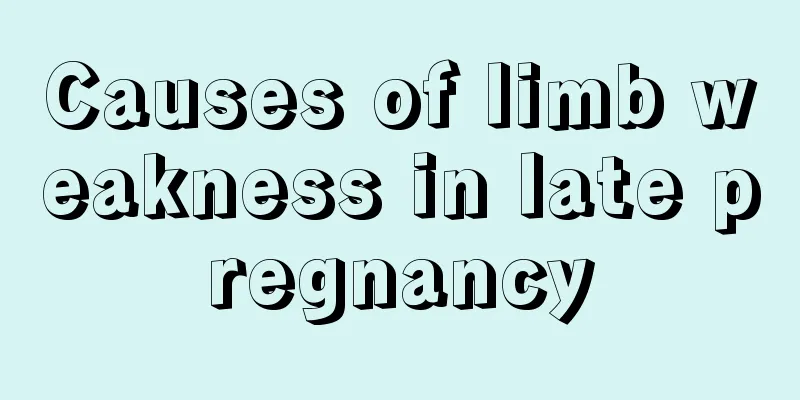Why does a woman feel pain below her belly button?

|
Many people will have questions about why women feel pain below their belly button. Let us first understand what structures are in this area. Below a woman's navel are mainly the jejunum, ileum, uterus, appendages and ovaries, and the bilateral ureters also pass through this place. When the above organs become inflamed or when there are ureteral stones, symptoms of pain below the navel will appear. Let us now take a closer look at what causes pain below a woman’s belly button. Abdominal pain refers to pain from below the ribs to above the groin. Abdominal pain may be caused by gastrointestinal diseases such as the liver, gallbladder, pancreas, gynecological diseases, or problems with the urinary and reproductive organs. Mild abdominal pain is mostly caused by minor gastrointestinal problems such as indigestion. Persistent, severe abdominal pain without diarrhea may be a serious illness. Abdominal pain with vomiting, pain that does not subside after vomiting, a soft and swollen abdomen, or the patient is drowsy and unconscious, may be due to any of the following very serious illnesses. ① Gastrointestinal diseases: gastric ulcer, cancer, appendicitis, intestinal obstruction, intestinal perforation, intussusception, acute intestinal ulcer, local enteritis, etc. ② Diseases of the urinary and reproductive systems: renal colic, pyelonephritis, prostatitis, and cystitis caused by kidney stones or cancer. ③ Various gynecological diseases: ectopic pregnancy rupture, ovarian cyst pedicle torsion. ④Hepatobiliary diseases: cholecystitis, hepatitis, cholelithiasis. ⑤ Peritonitis caused by different reasons. ⑥Thrombotic diseases. For the patient's safety, see a doctor or go to the hospital emergency room immediately. Never take aspirin or other narcotic painkillers for abdominal pain. Aspirin is harmful rather than helpful for abdominal pain, and narcotic analgesics can mask symptoms and interfere with diagnosis. 1. Symptoms: Abdominal pain below the waist (navel), burning sensation when urinating, and increased frequency of urination. Possibility: Bladder inflammation. Treatment: Antibiotics are required. However, doctors will further use pyelography to investigate the cause of inflammation and then provide symptomatic treatment. 2. Symptoms: Abdominal pain lasts for more than 1 hour. Possible: There are many causes of abdominal pain, and it requires an expert diagnosis. See a doctor immediately regardless of any other symptoms. Treatment: Do not eat until you see a doctor. If the doctor cannot figure out what the problem is, the patient will have to stay in the hospital and can only be treated after the problem is found out. Persistent abdominal pain without diarrhea may be a sign of a serious illness. 3. Symptoms: Abdominal pain lasts for more than 1 hour, accompanied by vomiting. The abdominal pain does not subside after vomiting, and the abdomen is swollen. Severely ill patients may become drowsy or confused. Possible: It is a very serious symptom. Treatment: Do not eat until you see your doctor. Go to hospital immediately. If the doctor cannot diagnose the condition, he may need to perform an open abdominal surgery. The operation is to open the patient's abdominal cavity for direct inspection. Only after finding out what the disease is can we provide symptomatic treatment. 4. Symptoms: abdominal pain lasting more than 1 hour and diarrhea. Possibility: Abdominal pain and diarrhea are mostly caused by eating unclean food (food poisoning), which causes gastrointestinal inflammation. Treatment: If the symptoms do not disappear, please pay attention to the following points. ①Do not eat solid food and do not drink milk. ②Drink at least 1 liter more boiled water every day (without adding sugar). ③If you have diarrhea too often, drink light salt water (add half a teaspoon of salt to 1 liter of water) to replenish the water lost due to diarrhea. ④ If you find red or colorless nasal mucus in your stool, you should see a doctor. 5. Symptoms: Abdominal pain starts from the waist and then moves downward to the groin. Possible: ureteral problems, kidney inflammation or stones. Treatment: Go see a doctor and get a urine test. ①Inflammation, treat with antibiotics. The patient should drink more water. ② Stones: The doctor may need to perform a pyelography on the patient to check for stones. Depending on the nature of the stones, the patient should drink more water. You can try dissolving the medicine. Some people have achieved good results by taking allopurinol (a gout treatment drug) together with potassium salt, but this needs further confirmation. Ultrasound can also be used to break up stones and achieve satisfactory results. Surgery is the only option when necessary. To prevent stone regeneration, patients should eat low-calcium and low-purine foods. 6. Symptoms: Women experience abdominal pain in the middle and lower parts of the body, with sudden and severe paroxysmal pain. Possible: May be due to torsion of ovarian cyst pedicle. Treatment: See a doctor immediately. The doctor will do an ultrasound and may need surgery if necessary. 7. Symptoms: Sudden lower abdominal pain in women of childbearing age with a history of amenorrhea, accompanied by irregular vaginal bleeding, syncope or shock. Possible: ruptured ectopic pregnancy. Treatment: Send to hospital immediately. For example, during a gynecological examination, bloody fluid can be extracted by puncturing the posterior fornix. The doctor needs to perform emergency surgery. 8. Symptoms: Pain on the right side of the waist below the ribs. Possible: Gallstones. Pain, nausea, and vomiting about two hours after eating. Treatment: See your doctor, who may be able to diagnose with an ultrasound scan. If the pain is too severe, the doctor may give the patient an injection to relieve the pain. Patients should pay attention to the following points. ① Eat less fatty foods. ②Take some muscle relaxants. ③Take some painkillers, such as acetaminophen, if necessary. ④Take medicine to help dissolve gallstones. ⑤If the above treatment is ineffective, surgical removal of the gallbladder is required. 9. Symptoms: Abdominal pain is located in the upper abdomen, below the chest. Possible: indigestion. Treatment: Go to the pharmacy and buy some digestive medicine. Don't eat too much at each meal. If attacks occur frequently and become more severe, see a doctor. 10. Symptoms: Abdominal pain lasting for more than 3 hours, first around the navel, with or without vomiting. When you touch the midpoint of the straight line from the hip bone to the navel (the location of the appendix), it hurts a lot. Possible: appendicitis. Acute appendicitis may also cause fever. Treatment: See a doctor. Doctors treat the patient with antibiotics and, if necessary, surgery. |
<<: Why does it hurt when I have my period?
>>: How to wash a girl's stinky private parts
Recommend
Pay attention to sleep when losing weight, staying up late will increase the risk of obesity
When it comes to losing weight, most people focus...
What are the methods to unclog the fallopian tubes?
Many women and men have experienced infertility, ...
What is the main cause of C-shaped uterus?
For a woman to become pregnant and have a baby, s...
What plant is the cashew nut a fruit of? Why are cashew nuts not in the shell?
Cashew is an evergreen tree or shrub. Its nuts ar...
How many days does it take for amniocentesis to produce results?
Amniocentesis is a relatively important examinati...
Good news for people with allergies. Will the new coronavirus avoid you?
[This issue's rumor]: Recently, there are rum...
What causes nipples to become larger
We all know that women's breasts are the seco...
The whole process from vaginitis to cervical cancer
The first point is to do a good examination: Gene...
What does the four-dimensional examination of pregnant women mean?
One of the most important things during pregnancy...
After the Waking of Insects, eating spring bamboo shoots is a big deal! They are so fresh and tender!
The third solar term of spring, Jingzhe, is comin...
Can pine pollen fight cancer, prevent aging, and treat cardiovascular disease? Don’t be fooled!
"Pine pollen can fight cancer, prevent aging...
Causes of early menstruation in the 40s
Women in their 40s are in their prime, and their ...
Is brown discharge normal during ovulation?
What is the ovulation period? For those of us who...
How should pregnant women sit to benefit the fetus?
After pregnancy, there are many things that pregn...
Can I eat carambolas during confinement?
Nowadays, many young people become particularly p...









